Scammers are aggressively promoting GlycoShield, a blood sugar support supplement that raises many red flags. This product is widely advertised online, including on social media, using deceptive tactics to lure customers. The marketing for GlycoShield is full of false promises and misleading practices.
The promoters behind GlycoShield use fake endorsements, including deepfake videos featuring public figures like Sean Hannity, David Muir, Barbara O’Neill and Tom Hanks, and supposed endorsements from a fake “diabetes specialist” named Dr. Arthur F., claiming miraculous improvements in type 2 diabetes symptoms. However, a simple online search reveals no evidence to support these claims. The ads boast miraculous recoveries and unbelievable discounts, yet there is no credible research backing these assertions.
In addition, the product’s website displays flashy badges such as “FDA APPROVED” alongside trusted media logos, yet independent sources show no genuine reviews. Scam sites also use deceptive page designs that mimic credible news sources, initially presenting themselves as informational articles only to later push for immediate purchases, with fake testimonials appearing only in these phony contexts.
If you’re considering buying GlycoShield, think twice. It is crucial to consult a healthcare professional before trying any supplement, especially when it is marketed with unrealistic claims and fraudulent endorsements. Real health solutions should be based on sound medical advice, not deceptive online ads.
Table of Contents
🚨 Is GlycoShield a Scam?
GlycoShield is being promoted with deceptive tactics aimed at tricking people looking for a solution to manage blood sugar levels. These tactics are common among scammers who prey on individuals with serious health concerns.
Key Red Flags:
- 🌐 Fake Celebrity Endorsements: GlycoShield uses manipulated deepfake videos featuring well-known figures, falsely suggesting endorsements from trusted names like ABC News anchor David Muir and actor Tom Hanks. These endorsements and claims about controlling blood sugar are completely fabricated.
- ⭐ Fabricated Testimonials and Reviews: The product is promoted through staged articles and reviews that mimic reputable sources. These glowing testimonials cannot be verified on independent platforms, indicating that the reviews are likely invented.
- 🔒 Misleading Website Claims: The official site makes claims such as “FDA Approved” and “clinically proven”, which are misleading because there is no FDA approval for GlycoShield, and the clinical evidence for its use is non-existent.
- ⚠️ Exaggerated Health Claims: Promotional materials claim that GlycoShield can significantly improve blood sugar levels using a simple apple cider vinegar recipe. These claims are not supported by scientific evidence and may lead consumers to ignore proper medical treatment.
- 📉 Poor Website Quality and Questionable Redirects: Clicking on GlycoShield ads often leads to multiple domains with high-pressure sales tactics and dubious claims, typical of scam sites designed to confuse and mislead consumers.
- 👤 Misleading Use of Deepfake Technology: The promotional videos employ deepfake technology to create fake endorsements, giving the false impression that credible experts support GlycoShield. These manipulated visuals are solely intended to build unwarranted trust.
- 🔗 Dubious Purchase Links and Pressuring Sales Tactics: After promotional content, sudden discount offers appear—advertising significant price drops and limited availability to pressure consumers into a hurried purchase without proper consideration.
In summary, the numerous red flags surrounding GlycoShield suggest that it is part of a scam designed to deceive consumers. The use of deepfake endorsements, fabricated testimonials, exaggerated health claims, misleading website claims, questionable redirect tactics, and pressuring sales methods all point to a product that is not a genuine health solution. It is strongly advised to avoid GlycoShield and seek advice from qualified healthcare professionals for safe and proven health solutions.
🕵️♂️ How the GlycoShield Scam Operates
Scammers behind GlycoShield start by using targeted ads and sponsored posts on platforms like Facebook and Instagram. They publish misleading articles, fake testimonials, and use deceptive, celebrity-endorsed content to push their product into top search results while hiding any negative feedback. This approach attracts people looking for solutions to control blood sugar and manage diabetes.
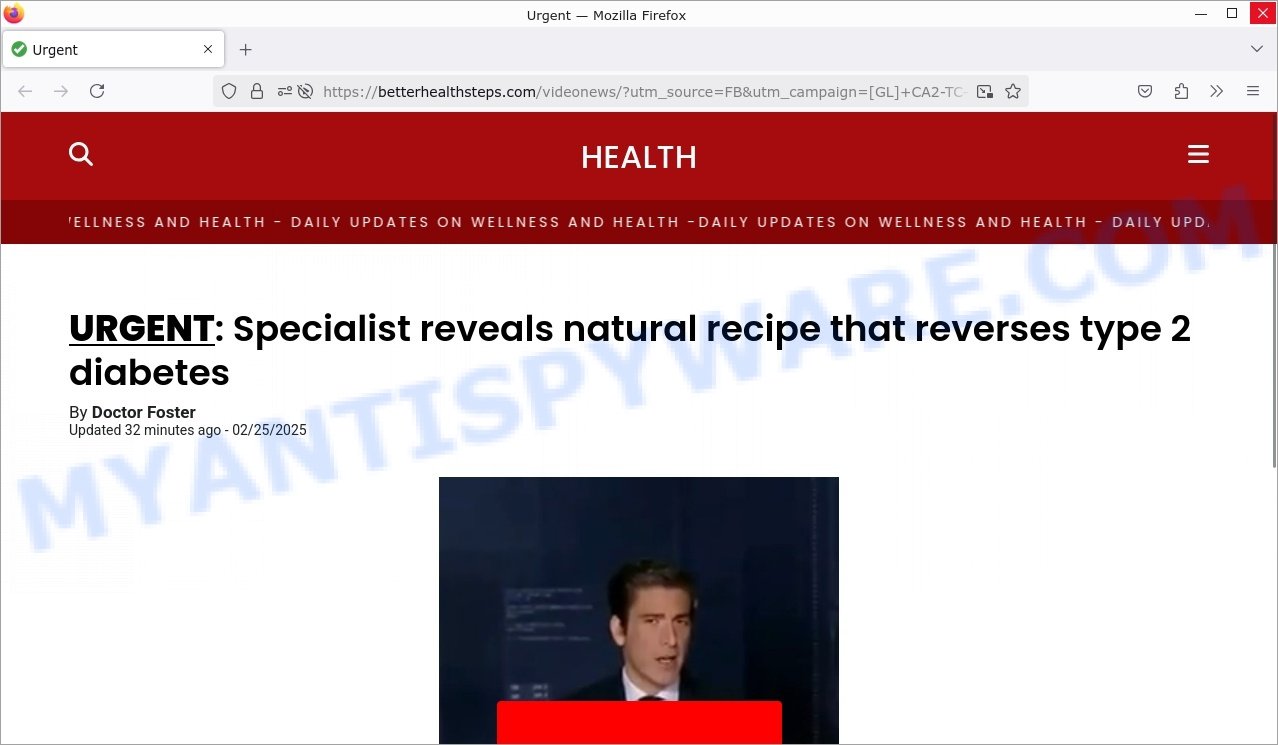
When users click on these ads, they are taken to fraudulent websites designed to look like legitimate health news outlets. These sites mimic the logos, layouts, and writing styles of credible sources such as ABC News and FOX News, making visitors believe that GlycoShield is endorsed by reputable figures and organizations.
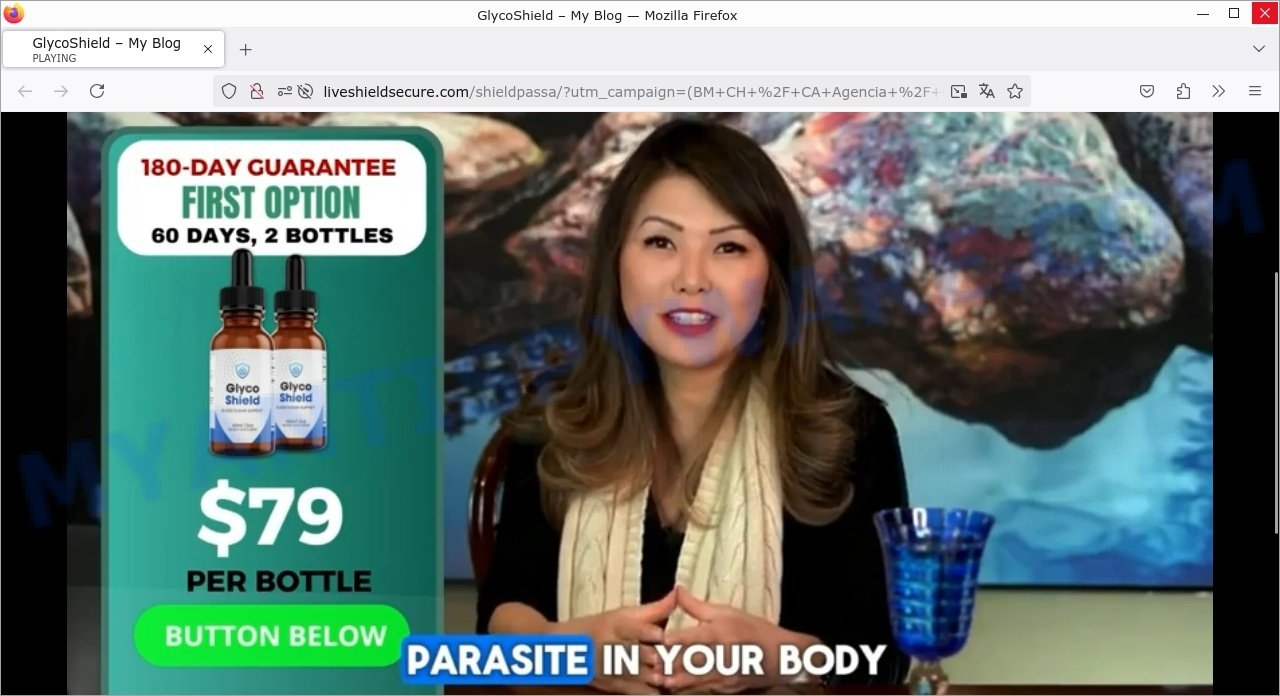
A common tactic is the use of fake expert endorsements. The scammers falsely claim that high-profile figures like ABC News anchor David Muir, Oscar-winning actor Tom Hanks, and a supposed diabetes specialist named Dr. Arthur F. back GlycoShield. They even use manipulated images and deepfake videos to create the impression that these well-known individuals support the product, lending it a false sense of legitimacy.
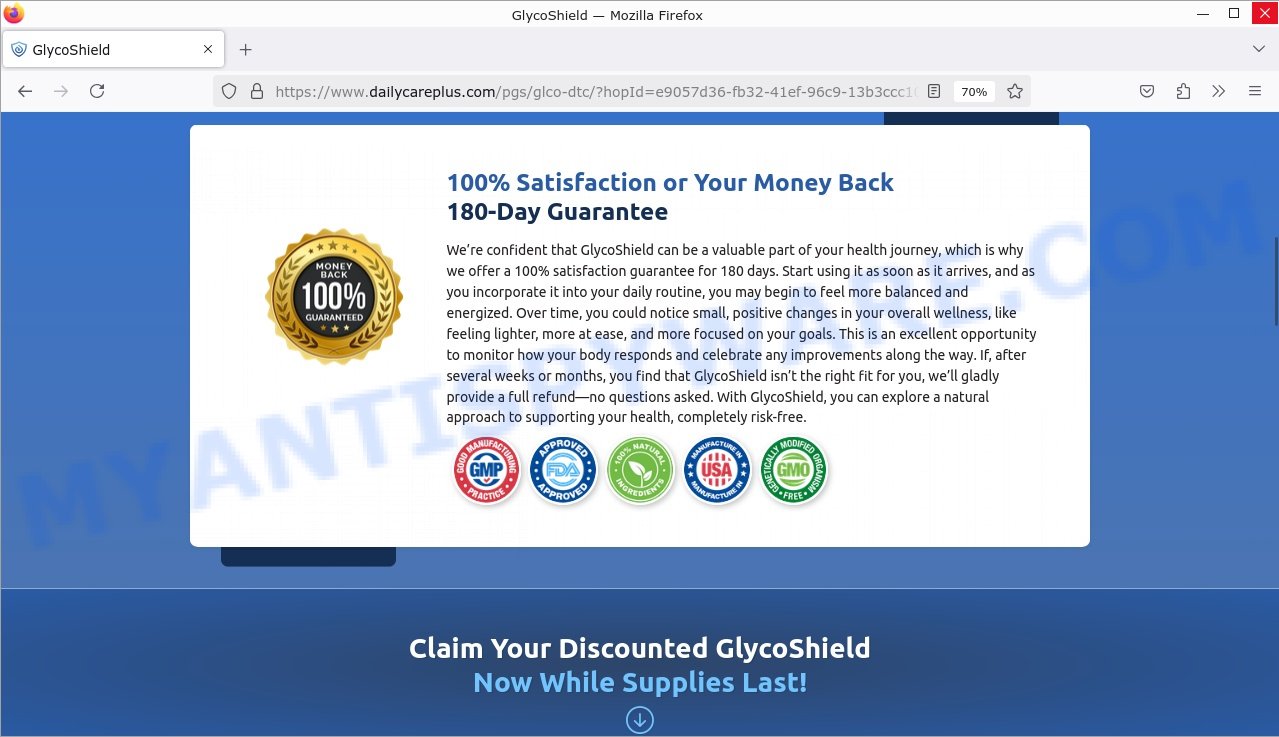
The scam websites often display an excessive number of trust logos and badges, such as “FDA Approved” and “Clinically Proven”, which are used to create a false sense of security. In reality, the FDA has not approved GlycoShield, and no real evidence backs the product’s effectiveness.
Marketing materials use urgent phrases like “Limited Time Offer” and “Exclusive Deal Today” to pressure consumers into making quick decisions without proper research. Promotions promise significant discounts and emphasize the scarcity of the product with statements like “Almost Gone” and “Claim Your Discounted Supply Now”.
Moreover, the only testimonials appear in the styled articles, featuring overly positive comments from supposed users. The official website itself lacks genuine user reviews or a reliable feedback system, and independent platforms show no credible reviews.
After victims make a purchase, scammers often push extra sales with unrealistic discounts or free shipping offers. Many buyers later find they have been charged recurring fees without clear consent, and attempts to obtain refunds are typically unsuccessful, leading to significant financial loss.
In summary, the GlycoShield scam uses misleading ads, fake expert endorsements, manipulated celebrity images, and fabricated reviews to trick consumers into buying a product with no scientific backing. Consumers ultimately end up deceived by exaggerated health claims and false promises.
🤔 Why Such Scams Are Possible
Quick Profit Motive
Scammers behind GlycoShield aim to earn money quickly by making unverified claims. They exaggerate benefits and use fake testimonials, including deepfake endorsements featuring a bogus “diabetes specialist” and unauthorized celebrity mentions, to lure customers before the scam is exposed.
Limited Oversight on Ad Platforms
Although social media and ad platforms try to block fraudulent ads, they can’t catch them all. This lets misleading promotions for GlycoShield slip through, reaching many people looking for simple solutions for blood sugar management.
🧠 Exploiting Human Psychology
The marketers behind GlycoShield know that many people are desperate for an easy fix to manage diabetes. By promising dramatic improvements and even reversal of symptoms with a natural remedy, they play on hopes and fears, causing consumers to ignore important details and warnings.
⚖️ Lack of Legal Consequences
These scams often use complicated setups with fake endorsements, several redirect websites, and manipulated media. This complexity helps the operators behind GlycoShield avoid legal consequences, as the layers of deception make it hard to hold anyone accountable.
👤 Anonymity on the Internet
Scammers use temporary domains, fake social media profiles, and deepfake videos to create a false sense of trust around GlycoShield. This anonymity makes it difficult for authorities to track them down and stop their deceptive practices.
😱 What to Do If Scammed
If you find yourself ensnared by the GlycoShield Scam, immediate action is crucial. Here’s what you should consider doing:
🛑 Stop Further Transactions
The first step is to halt any additional transactions that might be in process. Contact your bank or credit card provider and inform them that you’ve fallen victim to a scam. They can help by blocking the card or reversing any unauthorized transactions.
📞 Report the Fraud
File a report with your local police and provide all the available evidence, such as screenshots, emails, and website URLs. Additionally, report the scam to online portals like the Better Business Bureau (BBB) at www.bbb.org or the Federal Trade Commission (FTC) at reportfraud.ftc.gov. If you’re in another country, reach out to your national consumer protection agency.
💻 Take Screenshots
Before the scam website gets taken down or changes, make sure to capture screenshots of your transactions and communications. These can serve as evidence if you decide to pursue legal action.
⚖️ Consult Legal Advice
Speak to a legal advisor about your situation. While pursuing legal action may be time-consuming and costly, it could be a possible avenue for recovering your lost money.
📢 Share Your Experience
Use social media platforms to share your experience and warn others about the scam. Your story could prevent someone else from falling victim to the same or similar scams.
Summary Table
| Factor | Observations | Impact on Legitimacy |
|---|---|---|
| Product Description | GlycoShield is promoted as a breakthrough blood sugar support supplement. It features false endorsements by a so-called diabetes specialist, “Dr. Arthur F.”, and alleged mentions by celebrities like Sean Hannity, David Muir, Barbara O’Neill and Tom Hanks. The product’s claims are not supported by valid scientific evidence and rely on deepfake videos. | Negative (Unsubstantiated health claims and deceptive promotional tactics) |
| Reviews | Testimonials appear in fake articles designed to mimic legitimate sources. There are no verifiable reviews on independent platforms, and available user feedback is either manipulated or non-existent. | Negative (Fabricated testimonials and absence of independent reviews) |
| Marketing Channels | The product is advertised using deceptive techniques such as deepfake videos and false claims of FDA approval and media endorsements to mislead consumers. | Negative (Misleading marketing with fabricated media endorsements) |
| Price | GlycoShield is promoted with aggressive pricing tactics and limited-time offers that pressure consumers into making quick purchases without proper evaluation. | Negative (Pressure selling tactics and misleading pricing claims) |
| Real Functionality | The supplement claims to support blood sugar regulation through a secret apple cider vinegar formula, but there is no scientifically verified evidence to support these benefits. | Negative (Unproven claims with no scientific backing) |
| Company Contacts | The company provides minimal contact information and lacks transparency regarding its operations. | Negative (Inadequate customer support and lack of company transparency) |
| Product Source | False claims of FDA approval and the unauthorized use of trusted logos are employed to create a false impression of legitimacy. | Negative (False advertising regarding product approval and source) |
| Safety Claims | Although marketed as safe due to its natural ingredients, the product does not offer detailed information on potential side effects or interactions, raising concerns about consumer safety. | Negative (Lack of comprehensive safety information and misleading safety claims) |
| Website Transparency | The website uses high-pressure sales tactics, such as urgent messages and limited stock warnings. Company details and registration information are hidden, raising concerns about transparency. | Negative (Deceptive sales tactics and opaque website practices) |
| Refund Policy | While a money-back guarantee is promoted, customer reports indicate difficulties in obtaining refunds, suggesting that the refund policy may be misleading. | Negative (Difficult refund process and deceptive policy communication) |
Conclusion
The GlycoShield Drops is a scam, relying on fake reviews, fabricated endorsements, and manipulated videos to create a misleading appearance of trustworthiness. The scammers behind GlycoShield use deepfake technology and false claims, including fake endorsements from a supposed “diabetes specialist” and unauthorized celebrity mentions featuring figures like ABC News anchor David Muir and Oscar-winning actor Tom Hanks, to lure potential buyers.
Instead of offering genuine benefits, consumers are misled by bogus testimonials and exaggerated claims that promise revolutionary blood sugar control. The website employs urgent language, deceptive mimicry of credible news sources, and falsely displays an “FDA Approved” logo—when in reality, no such approval exists—ensuring that customers are deceived into believing in the product’s efficacy, with little to no real benefit.
Bottom Line: Avoid GlycoShield. Always verify any health product that makes unrealistic claims, especially when the marketing relies on deceptive tactics, fraudulent endorsements, and manipulated videos.
Stay cautious and do your research; if an offer seems too good to be true or depends on fraudulent testimonials, it is most likely a scam.
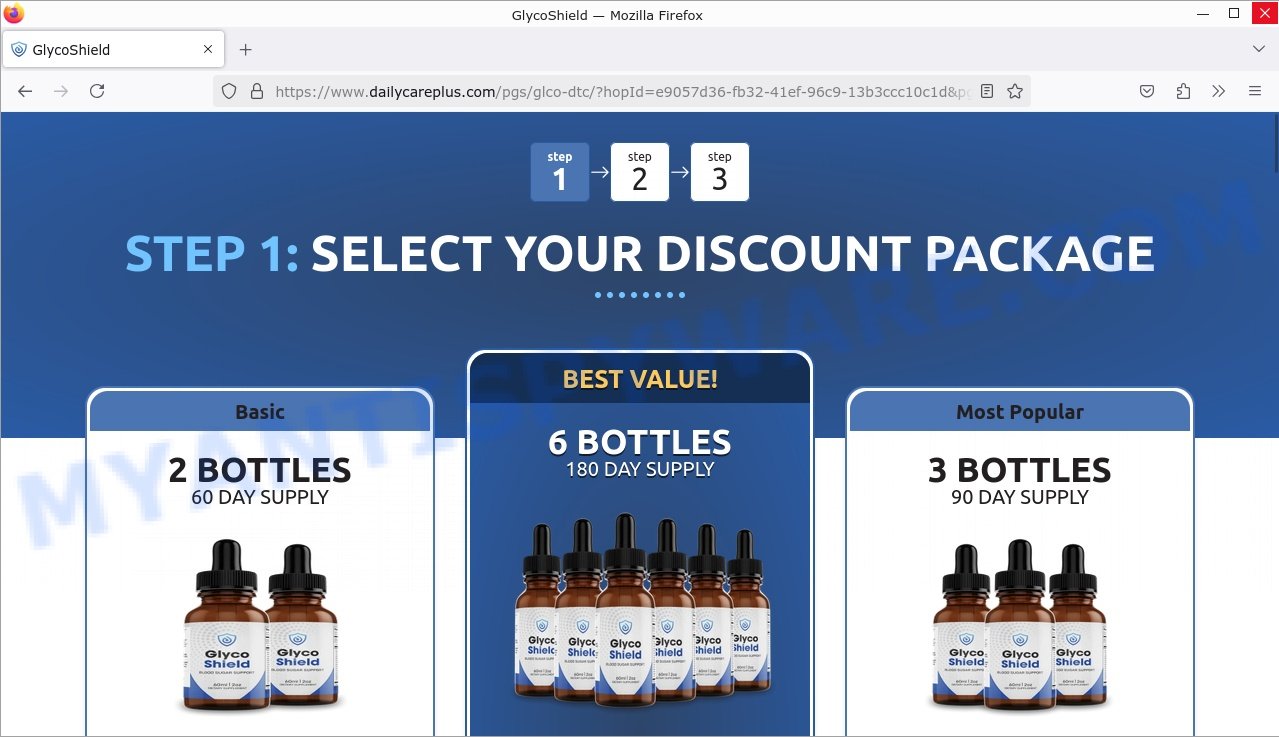
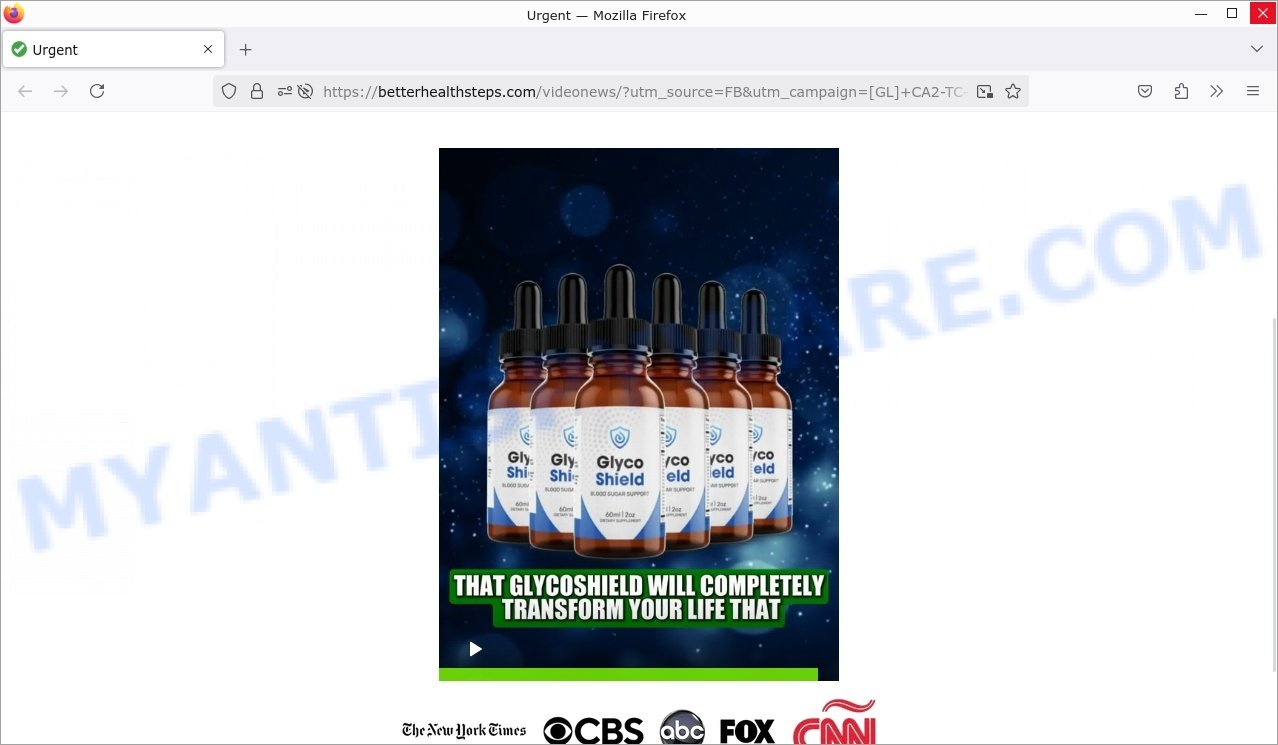
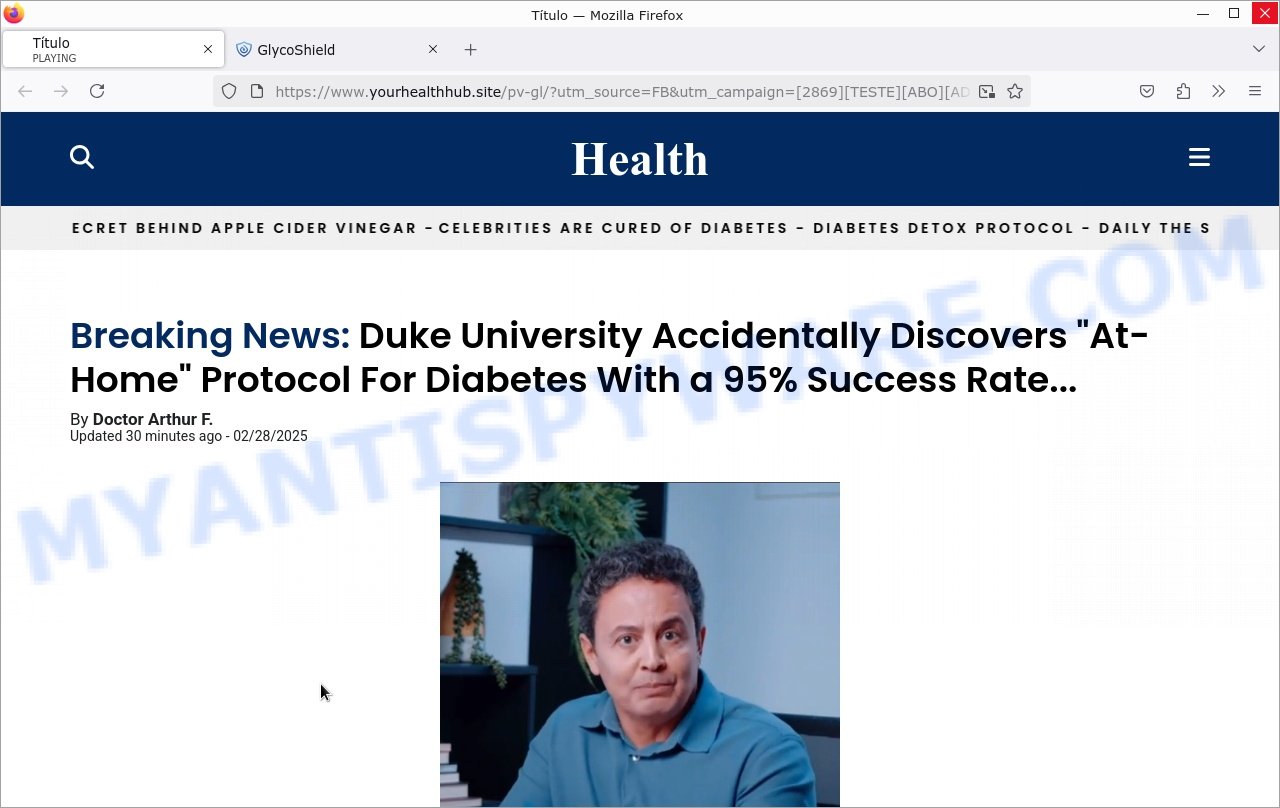
















Dr. Ken Barry says he invented it. Cinnamon Is the main ingredient and it will cure pre diabetes. He says there is bacteria in your gut that eats insulin at night causing diabetes.
I tried to find who invented this product from a reputable source
but was unable . I came very close to purchasing 3 bottles for $207.00, then saw e bay selling it for $22.00. This made me suspicious. I’m very disappointed. I was hoping it was true.